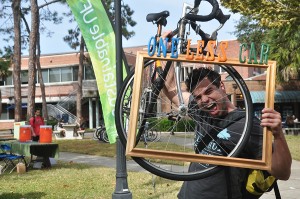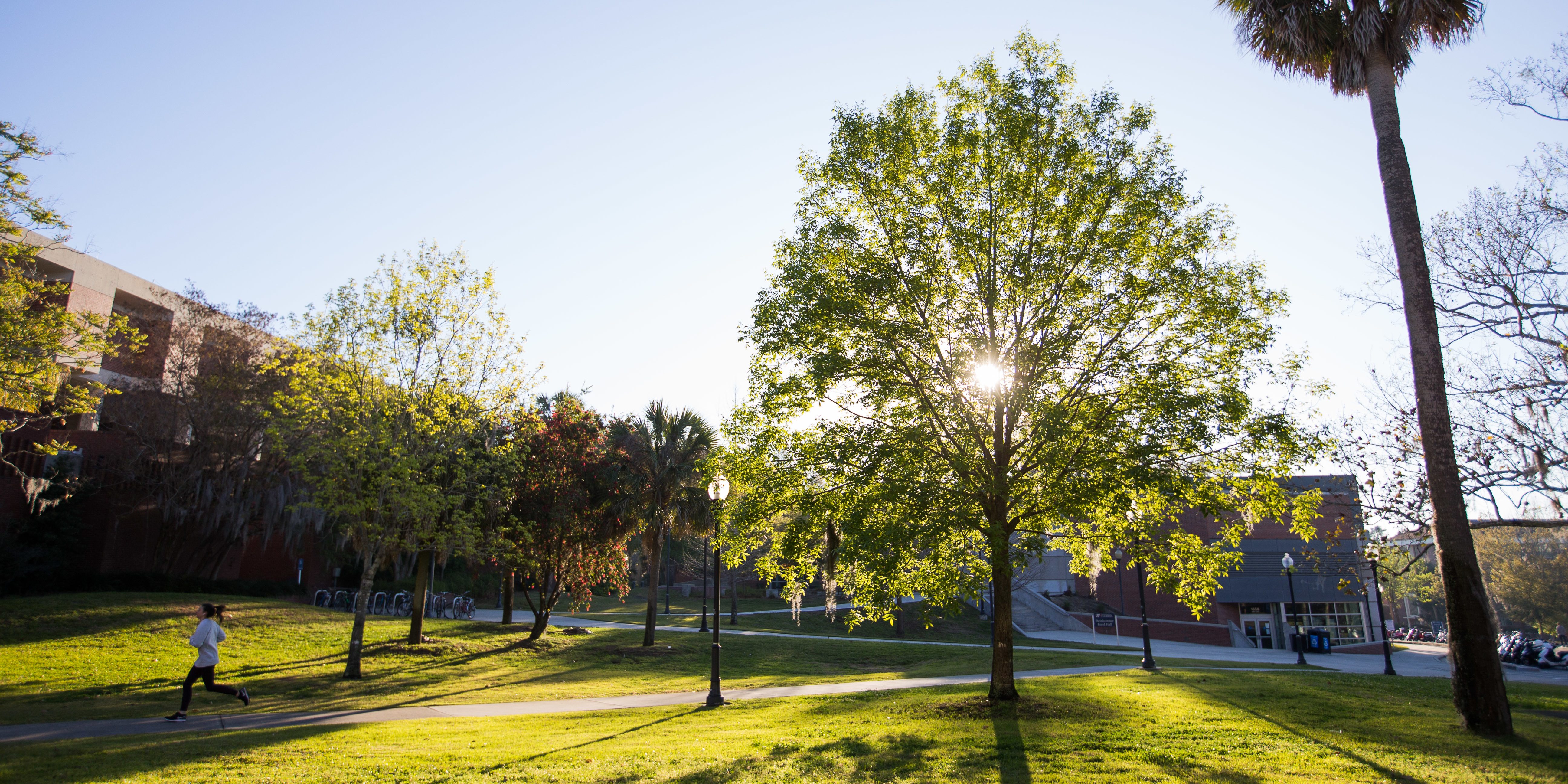One Less Car Campaign highlights importance of sustainable transportation
By Michelle McNally, Contributing Writer

One Less Car – Sustainable Transportation Fair 2014
GAINESVILLE, Fla. — On any given weekday there can be 50,000 students, 17,000 faculty and staff and a number of visitors on UF’s campus. With that amount of people, the campus functions like a small city. It is not surprising that traffic is a usual occurrence and parking is a challenge.
The University of Florida has established many alternative options for transportation in order to alleviate problems with congestion, parking and the environmental impact of cars. These options allow students, faculty and staff to avoid the stress of having a car on campus while reducing the total carbon footprint of commuters.
Every year, UF’s Office of Sustainability organizes a One Less Car Campaign. This campaign asks students, faculty and staff to reduce the amount of single occupancy vehicles – SOVs – driven onto campus and encourages commuting by alternative forms of transportation as often as possible.
This year’s campaign kickoff event, the Sustainable Transportation Fair, was held on November 5. The fair, cosponsored by the Office of Sustainability and Transportation and Parking Services, included a variety of activities for attendees and provided information about sustainable transportation options available on campus. The fair also provided students, faculty and staff with an opportunity to pledge their commitment to using sustainable forms of transportation.
Since the program began in 2008, more than 6,000 people have participated in the One Less Car campaign.
The campaign asks the UF community to find other ways to travel to and around campus throughout the year, and especially during One Less Car Week – November 17 -21.
Allison Vitt, outreach and communications coordinator at the Office of Sustainability, said the goal of the fair was to equip people with the information that they need to be able to make a change.
SOVs are a main concern that the campaign is trying to address. Ron Fuller, assistant director at Transportation and Parking Services, said, “I’ve been doing what I do for about 25 years, and the numbers never change. Very rarely do you see multiple people in a car coming onto campus.”
Dylan Sleszynski, a second-year sports management major, said the majority of cars he sees on campus only have one person in them.
“The One Less Car [Campaign] is a great thing because you drive around and see one person in a car, and then you have 50 cars, one parking lot, and you could’ve just used 10 cars for all the people that are using the cars,” Sleszynski said. “They are all going to the same place, why not?”
Fuller said SOVs are something all transportation planners try to reduce.
“You can reduce the number of single occupancy vehicles that are coming into campus by [providing] mass transit, by encouraging carpooling, by encouraging bicycling and by encouraging pedestrians to walk,” Fuller said.
Integrating these options has reduced UF’s carbon footprint and made more parking spots available on campus, Fuller said.
Sleszynski said he is a big fan of carpooling, which is one way to reduce SOVs.
“I [participate in] five different intramural [teams] every semester, and each day I’ll text everybody in the morning to see who is coming, and then I see if anyone wants a ride,” Sleszynski said. “I am willing to go five minutes out of my way so we’re not taking three or four cars to the same exact place at the same exact time.”
Sustainable forms of transportation available for students, faculty and staff include the Regional Transit System, biking, walking, the Carpool Program, the Zimride service, the Campus Cab, Zipcar, Gotcha Ride, Student Nighttime Auxiliary Patrol and the Gator Lift, according to the Sustainable UF website.
Fuller said that anything that can be done to reduce the number of cars coming onto campus is a benefit for everyone.
“It opens up parking spaces to people who have legitimate needs or child care issues— and there may not be another option for [them],” Fuller said. “We are always going to have a need for parking. There is no way that we are going to reduce the number of vehicles, but there are ways that we can reduce the need for everyone to bring a vehicle.”
Vitt said the One Less Car Campaign is an ongoing effort.
“We have a goal at UF to be carbon neutral by 2025,” Vitt said. “We want to have as little of a carbon footprint as possible.”



